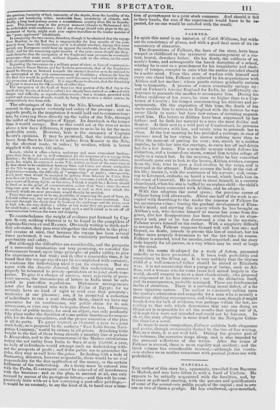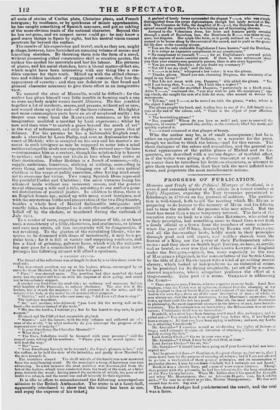MANDELL A.
THE author of this story has, apparently, travelled from Bayonne to Madrid, and may have fallen in with a band of Cellists. He appears to be actually acquainted with the localities, and, by hearsay or pell-mell meeting, with the persons and qualifications of some of the second-rate public people of the capital ; and to owe one or two of them a grudge. He has swallowed, open-mouthed,
all sorts of stories of Cellist plots, Christina plans, and French intrigues; by residence, or by quickness of mimic apprehension, he has caught something of Spanish manners, and got an inkling of the more obvious traits of the national character. Beyond this he has not gone, and we suspect never could go: he may know a good many things in Spain by sight, but his mental vision cannot penetrate far beyond the surface. The results of his experience and travel, such as they are, might perhaps, however, have furnished an amusing volume of scenes and travelling sketches. By throwing them into the form of a novel, without possessing either constructive skill or creative genius, the author has spoiled his materials and lost his labour. His pictures of places, and his social sketches, have a literal matter-of-fact air, which might have been interesting with any thing like a cre- dible voucher for their truth. Mixed up with the stilted charac- ters and wildest incidents of exaggerated romance, they lose the appearance of veracity ; and they are deficient in that broad and general character necessary to give them effect in an imaginative view.
To unravel the story of Manuella, would be difficult ; for the author has given himself very little trouble in forming such a one as even anybody might weave invitii Minerva. He has jumbled together a lot of incidents, scenes, and persons, without art or care, and wound them up at the end—of the three volumes. His lighter and more commonplace parts have an air of misplaced reality ; his deeper ones come from the RADCLIFFE romances, or his own imagination modified scmewhat by local experience ; whilst he now and then tries " to snatch a grace beyond the reach of art" in the way of refinement, and only displays a very gross idea of delicacy. For his persons he has a fashionable English rout', made a chevalier by Louis Philip, and sent as Ambassador to the court of Madrid; who is occupied on his own and his master's ac- count in such intrigues as may be supposed to enter into a mind neither enlarged by study nor experience. His natural son—the hero —accompanies him as secretary, though the relationship is known to neither ; and they turn out rivals in love when they arrive at their destination. Father Rodrigo is a Jesuit of romance,—oily, supple, ambitious, licentious, sticking at nothing, succeeding in every thing, and unconsciously bringing one of his own natural children to the verge of public execution, after having tried every art to overcome her virtue. Two young Spanish Dons represent the youthful Carlist and Christine ; the more virtuous losing his affianced bride without any necessary reason, and the greater rascal obtaining a wife and a title, according to our author s gene- ral distribution of poetical justice. In addition to these, there is an English female spy, mixed up with many court intrigues, and with the mysterious births and preservation of the two illegitimates, besides a whole host of Madrid fashionable intrigantes and courtly folks, who are dropped as it suits the author, or summarily killed off by the cholera, or murdered during the outbreak of July 183-1.
To a reader of taste, expecting a true picture of life, or at least such a consistency of a fable, characters, and sentiments, as labour and care may attain, all this incongruity will be disagreeable, if not revolting. To the glutton of the circulating library, who re- quires to be (hammed with doses of monstrosity, it may be a po- pular book : for it is full of variety and surprising contrasts, and has a kited of grinning, galvanic force, which with the unknow- ing may pass for a counterfeited life. Of some of the more level pa.isages the following extract will afford a specimen.
A CARLIST ereecn.
The thread of his reflections was at length broken by a sudden shout from the road-side.
The fear-struck postilion ran up to his leaders, whom, encouraged by an extra fee from Montreil, he had put to their full speed. " Para! " was shouted again. The postilion had then snatched the head reins, but the mules still bore on with the impetus of their gallop, and could not be immediately stopped. A musket was fired from the road-side; an ordinary and summary fashion with banditti of the Peninsula, to enforce obedience. The aim was at the leaders, but it struck the muleteer ; he fell entangled in the reins, and the weight of his body at the 'nuke' heads arrested their progress. " Maid ito," said a fellow who now came up, " did 1 not call thee to stop?" The muleteer was silent.
" So," said another, who followed, "you have hit the wrong nail on the head—the muleteer instead of the mule." " His was the harder, I warrant ye ; but he has learnt to stop now, in good wirnest."
Mcnteeil and De Clifford had meanwhile alighted. " Senores," said the former, with the wily softness and collected air of a man of the world, " by what authority do you interrupt the progress of the representative of majesty ?" your Excellency the Chevalier Montreil?" " What then ? "
" The Cura, Caballero, would be favoured with your presence," said the man of arms, taking off his sombrero. " Please you to be seated again; we will lead the way.'
" But "- " Your Excellency has only to be restated ; the Cura's pleasure is law," said the ruffian, as he held the door of the britechka, uud gently dress' 3Iontreil by the arm towards it.
The travellers obeyed. The shrill whistle of the bandit was now answered from the neighbouring wood. By the moonlight a troop of horsemen was seen advancing. In a few minutes the dead muleteer was disentangled from the feet of the leaders, which were conducted from the track of the road, at a brisk pace, towards the wood ; having passed the outskirts of which, the pace of the mules was relaxed, and the escort one and all leisurely lit their cigaritos. It is idle to affect to misunderstand the following unscrupulous allusion to the British Ambassador. The scene is at a fancy-ball, apparently introduced to show that the writer has been at one, and repay the expense of Ins ticket.]
A garland of lovely forms surrounded the elegant who was already distinguished from the corps diplomatique, though but lately arrived at Ma. drid. The Countess de Teba, the daughter of R—y-1, the Dutchess de It spread around the modern Paris a bewitching net of fascinating charms. Arrayed in the Valenciana dress, her brow and features partly revealed through a mask of Barcelona lace, the Dutchess de R.— was there to eon. quer, not disguise. Her sylph-like form as it partly reclined on V—s' arm, seemed to be borne along by thecurrent c:f the crowd, and to yield as the grace. ful lily does to the running stream.
" You are the only endurable Englishman I have known," said the Dutchest. " It is rather an expensive compliment to my countrymen." "No compliment to yourself, V— •' fur an Englishman's outward polish is at the expense of more essential merit. If there is more refinement about you than your countrymen generally possess, there is also more hypocrisy." " You are severe, Dutchess ; do you doubt my constancy ?" "Not till I see my rival," said the lady. " V—s is in love," whispered a low voice ; it was the gitana. " Thanks, gitana. Heard you not, charming Duquesa, the testimony of an angel in my favour?" " But I do not mean with you, Duquesa," slily added the gitana. " Yet will I not betray thee, V—s. Do I look like a traitor ?" " Rather so," said the mortified Duquesa, "particularly in a black mask, Adios V—s," continued she, "you may wish to join the conspiracy ;" say. ing which, she caught the arm of a little fat man, who seemed to devour her movements.
" Tell me," said V--s, as he moved on with the gitaua, "who, where is the object I adore?" The gitana caught his hand, and, leading him to one of the full-length mit. rors at the end of the saloon, said, " There is the object of your affection, V--s."
" The bewitching gitana? " "No; yourself! Whom do you love so well ? and, next to yourself, the Duquesa, of course," pursued she, archly, as she carelessly lifted her mask, and quickly replaced it. V--s stood entranced at that glimpse of beauty.
Who the author may be, is of small consequence ; but lie is either an equivocal man of fashion, or a reporter for the press, though we incline to think the latter,—and for this reason. The short dialogues of the salons and assemblies, and the general ex- ternal appearances of the public places of Madrid and its fre- quenters, are described with a certain degree of truthful effect, as if the writer were giving a clever transcript or report. But no sooner does he introduce his fictitious characters, or attempt to give them speech or motion, than they talk the most inflated non- sense, and perpetrate the most melodramatic actions.



























 Previous page
Previous page